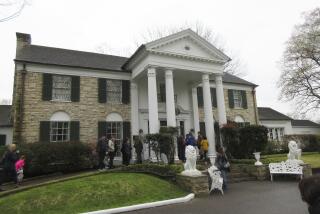Activist Ensures Seniors Are Heard on Health Reform
Alfred Golden might be Hillary Rodham Clinton’s worst nightmare--a senior citizen with an attitude and a fax machine.
“In Washington, they respect you and they fear you,” Golden, 84, fervently told a group of senior citizens sitting on folding chairs in a room at Van Nuys-Sherman Oaks Park in Sherman Oaks on Monday.
“But they will not respect you,” he said, holding a microphone in one hand and pointing at the audience with the other, “they will not fear you if you are not unified.”
It was a meeting of the Sherman Oaks-based National Health Care Coalition, a group made up mostly of the elderly that Golden helped found two years ago.
Golden had just returned from a week of lobbying in Washington, presenting the coalition’s views on the national health-care policy being formulated by Hillary Clinton’s White House task force.
The group’s policies were spelled out by its president, retired schoolteacher Dale Hines of Mission Hills. They want a system that allows them to choose their own doctor instead of a managed care program similar to that offered by health-maintenance organizations--such as the task force favors, according to reports.
The coalition also advocates the creation of a national health care board with broad powers to regulate health costs, instead of relying on the market forces of “managed competition,” which may be central to the task force’s plan.
To pay for the program, the group wants the current cap on annual Social Security payroll contributions lifted.
“It took us 40 years to get Social Security up to the point where it is running well,” Golden told the group.
“If you do not get off your butts and get heard, we will be repeating that whole, long process.”
Golden, who lives with his wife of 59 years in Granada Hills, is a former playwright with several Broadway shows to his credit, including the Judith Anderson vehicle “The Female of the Species” in the 1930s.
There were only 23 other coalition members there to hear his message. But Golden is accustomed to starting small.
In the mid-1980s, he was part of a small senior citizens’ current events study group that evolved into Seniors in Action, an activist organization that played a key role in the 1988 battle over a catastrophic-care insurance plan backed by the Bush Administration.
The bill had already been passed by Congress and signed by the President, but it was repealed in the wake of grass-roots protests by older Americans.
“That bill passed in the first place because we did not have a coalition to fight it,” Golden reminded the group. “We learned our lesson.”
More recently, Golden helped organize the Lincoln/ACC Bondholders Action Committee, a support group of Lincoln Savings & Loan bond investors that started out with just a handful of people meeting to commiserate after the S&L; went bust. But it ended up a highly vocal alliance with hundreds of members, that publicly cheered the legal victories against Charles Keating, former head of the thrift.
Several speakers echoed Golden’s cry for advocacy.
“The insurance companies are lobbying hard,” warned Alex Ende, who writes a newsletter for the Los Angeles-based Older American Social Action Council. “They want to control not only everyday health care, but also long-term health care.”
The subject was very much on his mind. Ende, 76, had to leave the meeting early to tend to his wife, who is having serious health problems.
Golden got a debate from Anthony Canales of Granada Hills, who at 35 was the youngest participant by far. He attended, he said later, simply because he had heard about the meeting at a Unitarian service and was interested in the subject.
“The money for your program is just not there,” he said during a question-and-answer period. The program that the group favors would so radically change the health-care system, he said, that it would put many people out of work. And their payment plan, he warned, was woefully inadequate.
“You say this program has worked in Canada, but do they have a Mayo Clinic, a City of Hope, and University of Pennsylvania?” he asked.
Golden smiled at Canales as the younger man spoke, but he was not too concerned. While the debate continued, he strolled outside with his wife to sit in the sun at a picnic table.
He returned to the theme of how important it was for the elderly to have access to government decision makers. “We have meetings right at my house,” he said. “That’s where the fax machine is.”
More to Read
The biggest entertainment stories
Get our big stories about Hollywood, film, television, music, arts, culture and more right in your inbox as soon as they publish.
You may occasionally receive promotional content from the Los Angeles Times.







